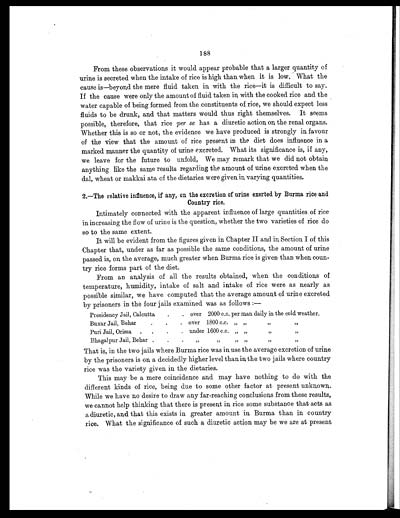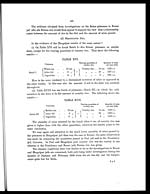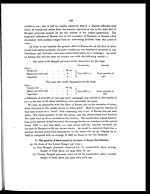Medicine - Institutions > Army health reports and medical documents > Scientific memoirs by officers of the Medical and Sanitary Departments of the Government of India > Number 37 - Investigations on Bengal jail dietaries > Part I > Chapter V - Some side-issues of the investigation
(198) Page 188
Download files
Individual page:
Thumbnail gallery: Grid view | List view

188
From these observations it would appear probable that a larger quantity of
urine is secreted when the intake of rice is high than when it is low. What the
cause is—beyond the mere fluid taken in with the rice—it is difficult to say.
If the cause were only the amount of fluid taken in with the cooked rice and the
water capable of being formed from the constituents of rice, we should expect less
fluids to be drunk, and that matters would thus right themselves. It seems
possible, therefore, that rice per se has a diuretic action on the renal organs.
Whether this is so or not, the evidence we have produced is strongly in favour
of the view that the amount of rice present in the diet does influence in a
marked manner the quantity of urine excreted. What its significance is, if any,
we leave for the future to unfold, We may remark that we did not obtain
anything like the same results regarding the amount of urine excreted when the
dal, wheat or makkai ata of the dietaries were given in varying quantities.
2.—The relative influence, if any, on the excretion of urine exerted by Burma rice and
Country rice.
Intimately connected with the apparent influence of large quantities of rice
in increasing the flow of urine is the question, whether the two varieties of rice do
so to the same extent.
It will be evident from the figures given in Chapter II and in Section I of this
Chapter that, under as far as possible the same conditions, the amount of urine
passed is, on the average, much greater when Burma rice is given than when coun-
try rice forms part of the diet.
From an analysis of all the results obtained, when the conditions of
temperature, humidity, intake of salt and intake of rice were as nearly as
possible similar, we have computed that the average amount of urine excreted
by prisoners in the four jails examined was as follows:—
| Presidency Jail, Calcutta | over 2000 c.c. per man daily in the cold weather. | ||||
| Buxar Jail, Behar | over 1800 c.c. „ „ „ „ | ||||
| Puri Jail, Orissa | under 1600 c.c. „ „ „ „ | ||||
| Bhagalpur Jail, Behar | „ „ „ „ „ „ | ||||
That is, in the two jails where Burma rice was in use the average excretion of urine
by the prisoners is on a decidedly higher level than in the two jails where country
rice was the variety given in the dietaries.
This may be a mere coincidence and may have nothing to do with the
different kinds of rice, being due to some other factor at present unknown.
While we have no desire to draw any far-reaching conclusions from these results,
we cannot help thinking that there is present in rice some substance that acts as
a diuretic, and that this exists in greater amount in Burma than in country
rice. What the significance of such a diuretic action may be we are at present
Set display mode to: Large image | Zoom image | Transcription
Images and transcriptions on this page, including medium image downloads, may be used under the Creative Commons Attribution 4.0 International Licence unless otherwise stated. ![]()
| Permanent URL | https://digital.nls.uk/75033309 |
|---|




